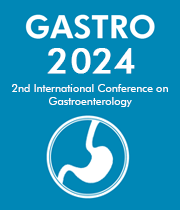Title : Novel exosomal biomarkers for MASH
Abstract:
Metabolic Dysfunction-Associated Steatohepatitis (MASH), a subset of Metabolic Dysfunction-Associated Steatotic Liver Disease (MASLD), has emerged as a significant public health concern worldwide. MASH is characterized by hepatic inflammation, which can lead to fibrosis, cirrhosis, and even hepatocellular carcinoma. Identifying reliable biomarkers for MASH has become a pivotal focus in the medical field, as they hold the potential to revolutionize both diagnosis and management of the disease.
One of the primary challenges in diagnosing MASH is its asymptomatic nature in the early stages. Currently, liver biopsy remains the gold standard for diagnosis, but it is invasive and associated with various risks. Biomarkers offer a non-invasive and more accessible alternative. The need for accurate, non-invasive diagnostic and prognostic tools has led to the exploration of novel biomarkers, with a recent focus on exosomes.
Exosomes, small extracellular vesicles secreted by various cell types, have gained recognition as potential biomarkers in MASH. These nanoscale vesicles encapsulate a diverse cargo of bioactive molecules, including proteins, lipids, and nucleic acids, reflecting the state of the parent cells. This unique composition makes exosomes promising candidates for capturing the intricate molecular changes that occur in MASH.
Exosomes have been investigated for their role in mediating inflammation, fibrogenesis, and lipid metabolism, all of which are key processes in MASH pathogenesis. They may serve as indicators of disease severity and progression. Additionally, exosomal miRNAs, which can regulate gene expression, have shown promise as specific biomarkers for MASH, capable of distinguishing it from simple steatosis.
The emerging role of exosomes as innovative biomarkers in MASH is on the horizon. Their potential as non-invasive, highly sensitive, and specific indicators of disease presence and progression underscores their significance in the ongoing efforts to combat MASH. Further research and validation are essential to fully unlock the diagnostic and prognostic potential of exosomes in MASH management.
Audience Take Away:
-
Understanding Exosomes as MASH Biomarkers: The audience will gain insight into the concept of exosomes as novel biomarkers for MASH, including their unique properties and potential for disease detection.
-
Diagnostic and Prognostic Applications: The presentation will explain how exosomal biomarkers can be used for accurate MASH diagnosis and to assess disease progression, offering non-invasive alternatives to traditional diagnostic methods.
-
Molecular Insights into MASH Pathogenesis: Attendees will learn about the role of exosomes in mediating inflammation, fibrogenesis, and lipid metabolism, enhancing their comprehension of the molecular mechanisms involved in NASH development.
-
Specificity of Exosomal miRNAs: The presentation will highlight the potential of exosomal miRNAs as specific biomarkers for distinguishing MASH from simple steatosis, providing clinicians with more precise diagnostic tools.
-
Future Research and Clinical Implications: The audience will be exposed to the ongoing research and validation needed to fully harness the diagnostic and prognostic potential of exosomes in MASH management, potentially inspiring further research endeavors.
How the Audience Can Utilize the Knowledge:
-
Improved Diagnostics: Healthcare professionals can employ exosomal biomarkers to enhance the accuracy and reliability of MASH diagnosis, leading to better patient care and management.
-
Disease Monitoring: Practitioners can utilize exosomal markers to monitor disease progression and treatment efficacy, guiding personalized treatment plans.
-
Research Opportunities: Other faculty members can leverage this research to expand their investigations into exosomes and their applications in liver disease or biomarker research.
-
Enhanced Design and Efficiency: Researchers and designers in the healthcare and diagnostic sectors can explore the practical use of exosomal biomarkers to streamline and simplify diagnostic procedures, potentially improving patient outcomes.
-
Advancing Medical Knowledge: This research contributes to the collective understanding of MASH pathogenesis, fostering the development of innovative interventions and therapies for liver diseases.
Additional Benefits:
-
Potential for earlier MASH detection, leading to improved patient outcomes.
-
Reduced reliance on invasive diagnostic procedures, enhancing patient comfort.
-
Tailored treatment plans based on accurate disease assessment.
-
Potential for cost-effective and accessible diagnostic tools.
-
Facilitation of collaborative research and interdisciplinary studies.
-
Advancements in liver disease management benefit both patients and healthcare professionals.



